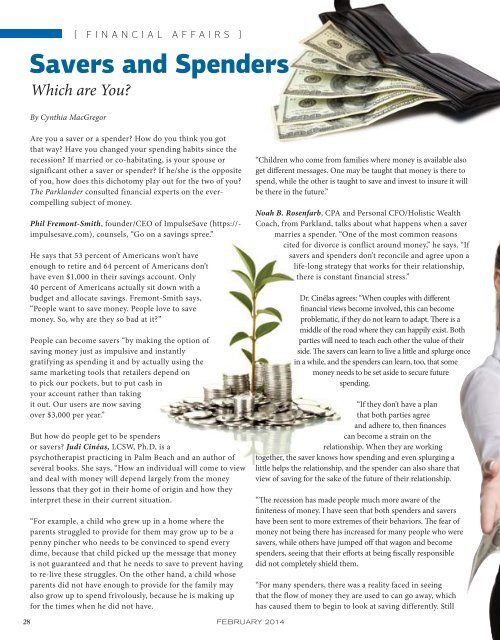parkland_february_2014_web_yp
You also want an ePaper? Increase the reach of your titles
YUMPU automatically turns print PDFs into web optimized ePapers that Google loves.
[ FINANCIAL AFFAIRS ]<br />
Savers and Spenders<br />
Which are You?<br />
By Cynthia MacGregor<br />
Are you a saver or a spender? How do you think you got<br />
that way? Have you changed your spending habits since the<br />
recession? If married or co-habitating, is your spouse or<br />
significant other a saver or spender? If he/she is the opposite<br />
of you, how does this dichotomy play out for the two of you?<br />
The Parklander consulted financial experts on the evercompelling<br />
subject of money.<br />
Phil Fremont-Smith, founder/CEO of ImpulseSave (https://-<br />
impulsesave.com), counsels, “Go on a savings spree.”<br />
He says that 53 percent of Americans won’t have<br />
enough to retire and 64 percent of Americans don’t<br />
have even $1,000 in their savings account. Only<br />
40 percent of Americans actually sit down with a<br />
budget and allocate savings. Fremont-Smith says,<br />
“People want to save money. People love to save<br />
money. So, why are they so bad at it?”<br />
People can become savers “by making the option of<br />
saving money just as impulsive and instantly<br />
gratifying as spending it and by actually using the<br />
same marketing tools that retailers depend on<br />
to pick our pockets, but to put cash in<br />
your account rather than taking<br />
it out. Our users are now saving<br />
over $3,000 per year.”<br />
But how do people get to be spenders<br />
or savers? Judi Cinéas, LCSW, Ph.D, is a<br />
psychotherapist practicing in Palm Beach and an author of<br />
several books. She says, “How an individual will come to view<br />
and deal with money will depend largely from the money<br />
lessons that they got in their home of origin and how they<br />
interpret these in their current situation.<br />
“For example, a child who grew up in a home where the<br />
parents struggled to provide for them may grow up to be a<br />
penny pincher who needs to be convinced to spend every<br />
dime, because that child picked up the message that money<br />
is not guaranteed and that he needs to save to prevent having<br />
to re-live these struggles. On the other hand, a child whose<br />
parents did not have enough to provide for the family may<br />
also grow up to spend frivolously, because he is making up<br />
for the times when he did not have.<br />
“Children who come from families where money is available also<br />
get different messages. One may be taught that money is there to<br />
spend, while the other is taught to save and invest to insure it will<br />
be there in the future.”<br />
Noah B. Rosenfarb, CPA and Personal CFO/Holistic Wealth<br />
Coach, from Parkland, talks about what happens when a saver<br />
marries a spender. “One of the most common reasons<br />
cited for divorce is conflict around money,” he says. “If<br />
savers and spenders don’t reconcile and agree upon a<br />
life-long strategy that works for their relationship,<br />
there is constant financial stress.”<br />
Dr. Cinélas agrees: “When couples with different<br />
financial views become involved, this can become<br />
problematic, if they do not learn to adapt. There is a<br />
middle of the road where they can happily exist. Both<br />
parties will need to teach each other the value of their<br />
side. The savers can learn to live a little and splurge once<br />
in a while, and the spenders can learn, too, that some<br />
money needs to be set aside to secure future<br />
spending.<br />
“If they don’t have a plan<br />
that both parties agree<br />
and adhere to, then finances<br />
can become a strain on the<br />
relationship. When they are working<br />
together, the saver knows how spending and even splurging a<br />
little helps the relationship, and the spender can also share that<br />
view of saving for the sake of the future of their relationship.<br />
“The recession has made people much more aware of the<br />
finiteness of money. I have seen that both spenders and savers<br />
have been sent to more extremes of their behaviors. The fear of<br />
money not being there has increased for many people who were<br />
savers, while others have jumped off that wagon and become<br />
spenders, seeing that their efforts at being fiscally responsible<br />
did not completely shield them.<br />
“For many spenders, there was a reality faced in seeing<br />
that the flow of money they are used to can go away, which<br />
has caused them to begin to look at saving differently. Still<br />
28 FEBRUARY <strong>2014</strong>


















